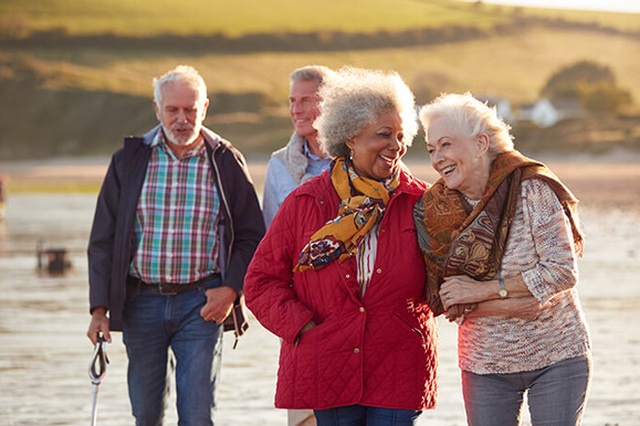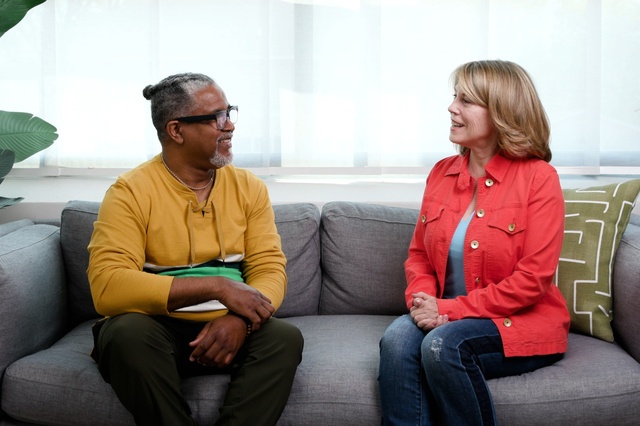Adult social well-being
As a society, we’ve become familiar with the terms “physical health” and “mental health.” But what about your social health?

What is social well-being?
Social well-being is also referred to as adult social wellness. The definition of adult social well-being is how we get along with other people and take part in our communities. Social well-being means being part of activities, feeling a part of a group, having support from others and having good relationships.
A 1998 article in Social Psychology Quarterly by Corey Keyes, titled “Social Well-being,” outlines the five dimensions of social well-being:
- Social integration: How well we connect with our community.
- Social contribution: Believing in your self-worth and contributions to society.
- Social coherence: Understanding how our society works together and is organized.
- Social actualization: Recognizing that society can grow, develop and improve.
- Social acceptance: Believing that other people are capable and kind. An overall belief in the goodness and skills of people.
Our personal viewpoints, relationships and interactions shape our social health. But what does adult social health and well-being look like every day? The answers may not be as complicated as you may think. Here are three examples of social well-being.
- Stay true to yourself — your values and beliefs — in all situations.
- Treat others with respect, regardless of their background or ability.
- Make new friends and develop new social networks.

Some adults may have outstanding social well-being. Others might need help getting started. Hello4Health will provide you with resources and guidance to improve your social well-being.
Why is social well-being important?
Adult social well-being is important to a fulfilling life and staying mentally and physically healthy. It helps you bounce back after a difficult situation and contribute to those around you. Social relationships affect all areas of our health.
- Mental health: Our relationships can help protect against common mental health issues, such as depression, anxiety and loneliness. Regular social interactions can provide emotional support, reduce stress and help you deal with challenges. The connection between social relationships and mental health is important.
- Physical health: Being socially active can improve our physical health. It can lower blood pressure, improve your immune system and reduce the risk of chronic diseases.
- Cognitive health: Social connections can help maintain your thinking skills. Being around people reduces the risk of cognitive decline and memory loss.
- Quality of life: Social well-being improves our quality of life. Having meaningful social connections and relationships helps us feel like we belong – and makes us happier.
One thing is certain: Having strong and meaningful connections matters more than the number of relationships. And establishing true relationships requires time, effort and communication skills.
How is social well-being related to emotional health?
Our social well-being is one part of our overall emotional health. The definition of emotional health, or emotional well-being focuses on a person's thoughts and feelings. It is our ability to understand our emotions and manage life's challenges. Good emotional health means we have healthy relationships and can adjust to new situations.
Key indicators of emotional health include:
- Emotional awareness: This involves knowing and understanding your own emotions. It also means understanding the feelings of others. When you can identify your feelings, it’s easier to control your behaviors.
- Positive relationships: Having healthy relationships is important for emotional well-being. Having people who support us helps us feel like we belong and feel safe. This feeling of security and connectedness leads to overall happiness and satisfaction.
- Self-esteem: Feeling good about yourself is important for emotional health. When you have a healthy self-esteem, it’s easier to recover from setbacks and failures.
- Coping strategies: Learning how to handle stress and negative emotions is important. Some people might talk with a friend. Other people may exercise, do yoga or focus on a hobby. Getting professional help when needed is also important.
- Self-care: Taking care of yourself physically, emotionally and mentally is important. You can balance your feelings with activities that bring you joy.
- Emotional expression: Being able to express your emotions in a healthy way is important. Bottling up emotions can lead to increased stress and mental health issues.
- Emotional regulation: This is the ability to control your emotions. It includes techniques like deep breathing, staying mindful and changing negative thoughts to balance your emotions. This helps you avoid feeling overwhelmed by intense emotions.
- Resilience: Emotional health means being able to come back after a setback. Resilient people are good at handling letdowns because they’ve learned how to adjust and find solutions to problems.

So far, we’ve defined adult social well-being and why social wellness is important for adults. We’ve also talked about social wellness as part of our overall emotional health. We’ll now look at how to improve social well-being and social skills in our lives.
How can I improve my social wellness?
Just like there are parts of our physical, mental or emotional health we may need to work on, the same goes for our social well-being. And, depending on what’s happening in your life, you might want to start with small social wellness goals. You may be wondering how to improve social health and why you should improve your social wellness.
Improving adult social wellness requires strengthening your existing relationships and making new connections. You’ll also want to find activities that match with your values and interests. Communication skills, such as listening, understanding emotions and handling disagreements calmly are important. An adult’s social well-being is connected to their mental and physical health too. Taking a holistic approach to your wellness and self-care is essential to living a healthy life as you age.
Consider these 15 ways to improve your social wellness. Pick one or two to focus on at a time to improve your social well-being.
- Join groups and clubs: When you participate in clubs, social groups or communities that share your interests, you’re likely to meet people who enjoy the same things you do. This will make it easier to make friends.
- Volunteer: Volunteering is a great way to connect with others who have similar interests. And you’ll be helping others at the same time.
- Attend social events: For some people, talking with a stranger can be a little scary. But when you challenge yourself to attend an event, you’re actively expanding your social circle and meeting new people. So go ahead, strike up that conversation!
- Share experiences: Talk about your experiences, thoughts and feelings with people you trust. When you share vulnerabilities, it can lead to deeper connections and understanding.
- Lifelong learning: Keep your mind sharp with activities that promote continuous learning. This provides personal growth and also provides opportunities to meet people with shared interests.
- Active listening: When you really listen and show interest in what someone is saying, you’ll develop a strong connection. Listen with empathy and respond with sincere interest.
- Communication skills: Clear and open communication is important for understanding someone. Good communication skills reduce misunderstandings. Learn how to talk about your thoughts and emotions.
- Develop empathy: Empathy is putting yourself in someone else’s shoes. It's about understanding how they feel and what they’ve gone through. When you show empathy to someone, you’ll develop a stronger connection with them.
- Practice gratitude: Show gratitude for the people in your life. When you take time to acknowledge the positive impact they have on your life, it strengthens the relationship. You never know who needs to hear that they matter to you!
- Self-care: When you take care of yourself, you're better able to engage socially. Although it often falls to the bottom of the to-do list, try to prioritize self-care and your mental health.
- Conflict resolution: Learning how to handle disagreements and misunderstandings is important. Resolving differences in a healthy and respectful manner helps maintain good relationships.
- Cultivate relationships: Building relationships with family, friends, neighbors, colleagues and community members is important. And it takes time. When you spend time nurturing these connections, it improves your social health and adds to the lives of others, as well.
- Maintain online connections: Balancing online and offline interactions contributes to a well-rounded social life. In-person activities are essential. Yet social media can help you connect with others and expand your friend group.
- Set boundaries: Set healthy boundaries in your relationships. It’s important to say no when necessary. This communicates your limits respectfully. It also maintains balanced social interactions and clear expectations.
- Reflect on relationships: Take time to think about your social connections occasionally. Are they positive and fulfilling? Consider whether any adjustments need to be made to strengthen your social network.
How do I promote social well-being?
There are many ways to promote social wellness within your group of friends, family, neighbors, colleagues and community – whether you’re a social butterfly or are just coming out of your cocoon. Creating a space or environment where people feel valued, connected and supported is important to promoting social well-being.
Here are five examples of how to create environmental wellness within your social circle or workplace.
- Encourage inclusivity: Make sure everyone feels included in the group. Celebrate the diversity and differences within your social circle. Try not to treat people unfairly or judge them based on differences. If someone doesn’t follow these rules, think about how you might deal with that in a fair and respectful way.
- Create safe spaces: One way individuals can build trust and form strong social bonds is by creating environments where people feel safe. Showing empathy allows people to express their thoughts, feelings and concerns without fear of ridicule or backlash.
- Foster a positive environment: If you focus on the strengths and positive qualities of individuals, you’ll create a positive atmosphere. Encourage optimism and celebrate success often. This will make people feel good about themselves and each other.
- Practice kindness: Acts of kindness, even small ones, can have a big impact on social well-being. They’re even more powerful when you don’t expect anything in return. Compliments, gestures of appreciation and offers of assistance can make a significant difference. As they say, “Throw kindness around like confetti!
- Lead by example: Demonstrate the behaviors and values you want to promote. Your actions can inspire others to do the same. Modeling positive behavior will contribute to a more well-balanced environment.

Now that you’ve created social well-being within your chosen environment, let’s talk about some social wellness activities you can do. Remember: the more you practice and promote social well-being, the more accepted it will be. And the more engaged others will become in social wellness activities.
What are examples of social wellness activities?
Hello4Health provides activities for social connections for people of all ages. Here are just a few:
Volunteer for your health and social benefits: Volunteering is a great way to make a positive difference in your community. Did you know that volunteering is good for the volunteer as well? Volunteering can bring you many benefits, including:
- Increased overall happiness
- Reduced stress
- Improved physical health
- Learning new skills
- Finding a sense of purpose
Read up on a virtual book club: Many people love gathering in person to talk with their friends about books. It often includes eating good food and sharing laughter and conversation. But sometimes it’s not possible to meet in person. A virtual book club is the answer! A virtual book club gives you an opportunity to see and connect with friends from your couch. Starting a virtual book club is easy as 1-2-3:
- Coordinate: Think about who you want to invite into your book club; consider keeping it small for easier coordination. Pick a day and time to meet. Maybe it’s the first Wednesday of every month or a specific monthly date. Choose what works for your group and send an invite. Then pick your books! It’s fun to let each person pick a book each month and let them lead the discussion. It is helpful to have books picked out a few months in advance so there’s plenty of time to buy the books or find them at the library — or in case someone finishes early and wants to start the next book.
- Connect: Find the communication website or platform that works for you. This could be Zoom or Google Meet for a fun virtual conversation or on Facebook as a private group to share thoughts through posts. You could even use email for sharing your thoughts on the book. It’s fun to send probing questions throughout the month for people to think about and react to.
- Meet: Find a comfy spot in your house and settle in with your computer or mobile device. Take the first part of the meeting to salute the group and the book. Then let the conversation begin.
Connect through sports and activities: Sports can help us connect with different groups of people through a shared interest. And there are many ways to participate in sports, whether it’s playing or cheering for your team. Consider one of the following ways to get active and connected:
- Join a local sports team. Local parks and recreation offer a variety of sports leagues where you can learn a new sport or pick up where you left off in your youth.
- Participate in a partnering sport, like tennis or pickleball. Community centers and fitness centers often have events or lessons you can attend alone or get partnered up with someone.
- Find a workout friend who will keep you motivated. Sometimes having an accountability partner for exercise is all you need to get moving. It works really well with individual sports like running, yoga and walking. Make a commitment to move and check in with your partner.
- Volunteer to coach a child’s sports team. Children can bring joy and humor to your life. You’ll also build connections with the parents and caregivers of kids on your team.
- Cheer on your local sports team with others. While you may not be on the field playing, the connection you make with others in the stands supporting your team is good for your health, too!
Host a neighborhood block party: Start by picking a time and place. Then spread the word. People often feel most comfortable in a shared public space, so consider hosting the get-together at a park or community center. If you want to avoid the hassle and expense of planning food or refreshments, have everyone to bring a dish to share or invite a local food truck to stop by.
Don’t feel obligated to provide entertainment. A simple meet-and-greet format is a great choice. If you choose to organize activities, keep it light. Make sure that everyone can participate and avoid anything too competitive.
Recap: why is adult social well-being important?
In this article, we’ve talked about adult social well-being, also called adult social health, and why it’s important. It’s one part of a person’s overall health and should be cared for just as you take care of your physical, emotional and mental health. The definition of adult social well-being is more than having a group of friends. It’s about having healthy relationships, participating in events, living in community and having people to lean on in difficult times.
Adult social wellness looks and feels different for each person. Yet there are simple ways to improve your social well-being while learning new skills, meeting new people and staying true to your beliefs. Investing time and energy in your social health has long-lasting results on your life.
Use Hello4Health to learn more about adult social well-being and connectedness. Check out our online resources and following us on social media.
